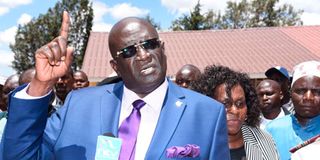Ministry cancels varsities’ conference at the last minute

Former Education Cabinet Secretary Prof George Magoha.
Public universities are counting their losses after the inaugural international vice-chancellors’ conference that was due to take place in Mombasa this week was cancelled at the last minute.
The Ministry of Education on Wednesday called off the June 15-17 forum without informing the VCs who were involved in planning after claims that senior departmental officials had not been consulted.
The meeting was to bring together chairpersons of varsity councils, VCs and principals of constituent colleges.
“We regret to inform you that the conference has been deferred due to unavoidable circumstances. New dates will be communicated in due time… We regret any inconvenience caused,” University Education and Research principal secretary Simon Nabukwesi said in a memo to VCs.
The cancellation came as a shock to VCs and council chairs as varsities had already released their staff to prepare for the conference. Many institutions had booked air tickets for their senior administrators such as VCs, council chairs and principals.
Other staff members had secured train and bus tickets to travel on Tuesday evening. The universities had also booked hotel rooms for their staff and had incurred huge costs to prepare for the conference.
The VCs’ committee had also booked and paid for conference rooms in readiness for the conference. “Some of our staff, especially the drivers, traveled on Monday and others on Tuesday; we had to pass the information to them while on their way to Mombasa,” said a source.
Participants were to establish the roles of stakeholders to develop aspirations and shared visions in the areas of governance, legislation and other regulations that can support public university education.
The aim is to ensure efficiency in governance and optimal operations, functions and establish strategies to reduce debt and guarantee sustainability.
Benchmarking
They were to discuss ways of benchmarking with the best practices across the globe on human resource and revenue generation that support academic programmes for improved efficiency and establish the appropriate structure for student placement and funding.
Participants were also to plan for strategic response on the continued changes in the education sector, especially in relation to implications of the competency based curriculum (CBC). Public universities are struggling financially and many have accumulated debts.
Financial flow from the National Treasury has been inconsistent.
The conference was also set to discuss how to balance between providing access and ensuring relevance of university education and employability of graduates, evolution of courses in the changing legal and policy environment, the integration of research and extension of Vision 2030 projects in institutions.
VCs were to look at the lessons learnt in Collective Bargaining Agreement negotiations and challenges in realising sustainable financing.
The Universities Academic Staff Union (Uasu) has called for industrial action several times in the last three years over unpaid salaries and non-remittance of statutory deductions.
Some of the scheduled key speakers included Education Cabinet Secretary Prof George Magoha, Commission for University Education chairman Prof Chacha Nyagotti, Mr Nabukwesi, CBC Principal Secretary Prof Fatuma Chege and officials from the Higher Education Loans Board.





